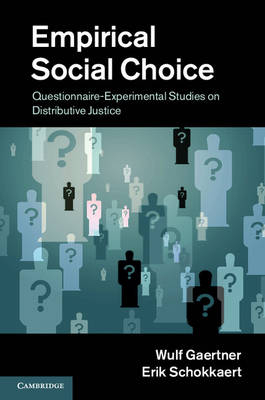
Empirical Social Choice
Questionnaire-Experimental Studies on Distributive Justice
Seiten
2011
Cambridge University Press (Verlag)
978-1-107-01394-0 (ISBN)
Cambridge University Press (Verlag)
978-1-107-01394-0 (ISBN)
Since Aristotle, many different theories of distributive justice have been proposed. This book shows that empirical insights are necessary if one wants to apply any theory of justice in the real world. It does so by confronting the main theories of distributive justice with data from questionnaire experiments.
Since Aristotle, many different theories of distributive justice have been proposed, by philosophers as well as social scientists. The typical approach within social choice theory is to assess these theories in an axiomatic way – most of the time the reader is confronted with abstract reasoning and logical deductions. This book shows that empirical insights are necessary if one wants to apply any theory of justice in the real world. It does so by confronting the main theories of distributive justice with data from (mostly) questionnaire experiments. The book starts with an extensive discussion on why empirical social choice makes sense and how it should be done. It then presents various experimental results relating to theories of distributive justice, including the Rawlsian equity axiom, Harsanyi's version of utilitarianism, utilitarianism with a floor, responsibility-sensitive egalitarianism, the claims problem and fairness in health.
Since Aristotle, many different theories of distributive justice have been proposed, by philosophers as well as social scientists. The typical approach within social choice theory is to assess these theories in an axiomatic way – most of the time the reader is confronted with abstract reasoning and logical deductions. This book shows that empirical insights are necessary if one wants to apply any theory of justice in the real world. It does so by confronting the main theories of distributive justice with data from (mostly) questionnaire experiments. The book starts with an extensive discussion on why empirical social choice makes sense and how it should be done. It then presents various experimental results relating to theories of distributive justice, including the Rawlsian equity axiom, Harsanyi's version of utilitarianism, utilitarianism with a floor, responsibility-sensitive egalitarianism, the claims problem and fairness in health.
Wulf Gaertner is Professor of Economics at the University of Osnabrück. He is also a visiting professor at the London School of Economics. Erik Schokkaert is Full Professor and Director of the Centre for Economics and Ethics at the Catholic University of Leuven.
List of figures; List of tables; 1. Introduction; 2. Why and how?; 3. Traditional questions; 4. Fairness; 5. Fairness in health; Final remarks; References; Index.
| Zusatzinfo | 51 Tables, black and white; 6 Line drawings, unspecified |
|---|---|
| Verlagsort | Cambridge |
| Sprache | englisch |
| Maße | 155 x 235 mm |
| Gewicht | 500 g |
| Themenwelt | Sozialwissenschaften ► Politik / Verwaltung ► Politische Theorie |
| Wirtschaft ► Volkswirtschaftslehre ► Mikroökonomie | |
| ISBN-10 | 1-107-01394-1 / 1107013941 |
| ISBN-13 | 978-1-107-01394-0 / 9781107013940 |
| Zustand | Neuware |
| Haben Sie eine Frage zum Produkt? |
Mehr entdecken
aus dem Bereich
aus dem Bereich
ein Vortrag
Buch | Softcover (2024)
Suhrkamp (Verlag)
CHF 13,95
Geschichte, Vordenker, Organisationen
Buch | Softcover (2023)
C.H.Beck (Verlag)
CHF 18,90


